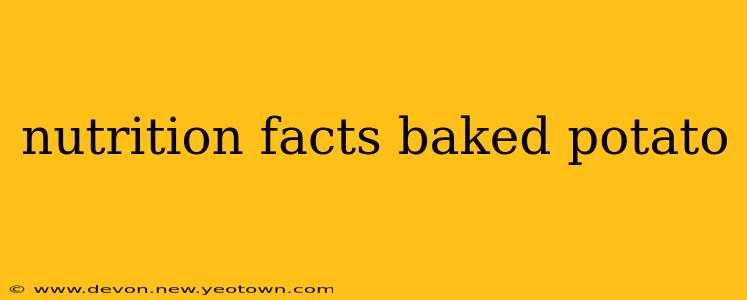The humble baked potato. Often overlooked, it’s a nutritional champion hiding in plain sight. Far from being just a simple side dish, this starchy spud packs a surprising punch of vitamins, minerals, and fiber. Let's peel back the layers (literally!) and uncover the incredible nutritional facts of the baked potato.
Our journey begins with the understanding that a medium-sized baked potato (about 5.3 ounces or 150 grams) provides a foundation of essential nutrients. But the nutritional profile can vary slightly based on factors like the potato variety and how it's prepared.
What are the nutritional benefits of a baked potato?
The baked potato shines primarily due to its impressive carbohydrate content, mainly in the form of starch. This provides readily available energy to fuel your body. However, it's not just empty calories. A baked potato is an excellent source of:
- Potassium: Crucial for maintaining healthy blood pressure and muscle function. A single baked potato can provide a significant portion of your daily potassium needs.
- Vitamin C: A powerful antioxidant that supports the immune system and protects cells from damage.
- Vitamin B6: Important for brain development, red blood cell formation, and immune function.
- Fiber: Promotes digestive health, helps regulate blood sugar levels, and contributes to feelings of fullness. This is where the skin plays a crucial role – don't peel it!
- Manganese: Essential for bone health, wound healing, and metabolism.
How many calories are in a baked potato?
A medium-sized baked potato typically contains around 161 calories. However, remember that the addition of toppings like butter, sour cream, cheese, or bacon significantly increases the calorie count. Choosing healthy toppings like salsa, chili, or low-fat Greek yogurt can help keep your calorie intake in check while enhancing the flavor.
Is a baked potato good for weight loss?
The baked potato's role in a weight loss plan is a complex one. While it's relatively low in calories compared to many other carbohydrate sources, its high carbohydrate content could potentially hinder weight loss if not managed carefully within a balanced diet. The fiber content, however, aids in satiety, making you feel full and potentially reducing overall calorie intake. The key is portion control and mindful topping choices.
Are baked potatoes healthy?
Yes, baked potatoes are generally considered a healthy food choice when prepared without excessive amounts of unhealthy toppings. The nutrients they offer, particularly potassium and fiber, contribute to overall health and well-being. However, moderation is key, as with any food.
What are the downsides of eating baked potatoes?
While generally healthy, overconsumption of potatoes can lead to weight gain due to their carbohydrate content. Additionally, some individuals might experience digestive discomfort due to the potato's starch content. Always listen to your body and adjust your intake accordingly.
Baked Potato vs. Other Vegetables: Nutritional Comparison
While the baked potato is a nutritional powerhouse, it's essential to consider its place within a balanced diet that includes a variety of vegetables. Other vegetables offer different vitamins, minerals, and antioxidants. The key is diversity. A diet rich in different colorful vegetables is always the most beneficial approach.
The Verdict: A Versatile Nutritional Ally
The baked potato, when enjoyed in moderation and with smart topping choices, offers a wealth of nutritional benefits. It's a versatile and delicious addition to a balanced diet, providing energy, essential vitamins and minerals, and fiber. However, understanding its nutritional profile and making conscious choices regarding portion size and toppings is crucial to maximizing its health benefits. So, next time you reach for a baked potato, remember that you're not just enjoying a simple side dish; you’re fueling your body with a nutritional powerhouse.

